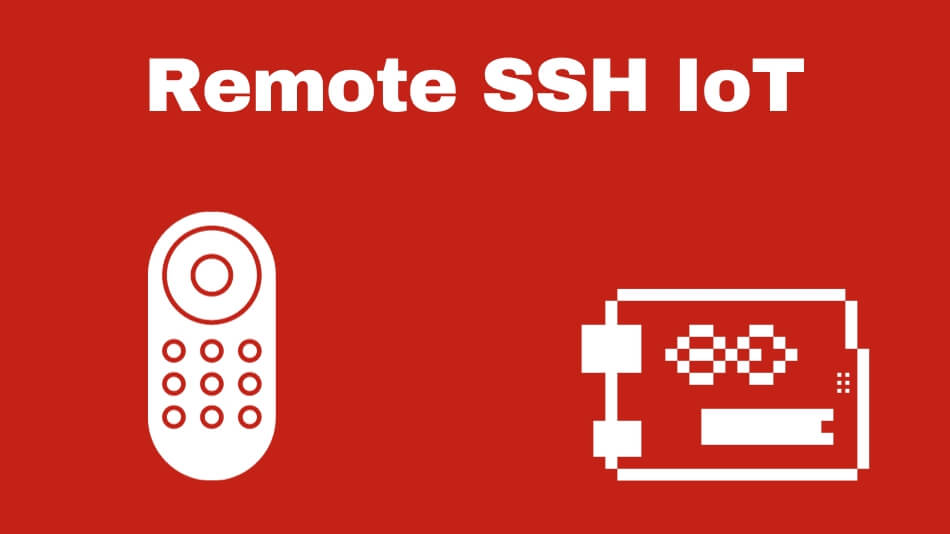How Do SSH Play Role In IoT? Unlocking Secure Communication In A Connected World
Have you ever wondered how devices in the Internet of Things (IoT) stay secure while communicating with each other? Well, SSH plays a crucial role in making this happen. Think of SSH as the digital bouncer at a club, ensuring only authorized guests get in and keeping unwanted visitors out. In today's hyper-connected world, SSH isn't just important—it's essential for maintaining trust between devices. So, let's dive into the nitty-gritty of how SSH impacts IoT and why it matters so much.
When we talk about IoT, we're talking about a massive network of devices that constantly exchange data. Now, imagine if all that data was floating around without any protection. Hackers would have a field day, right? That's where SSH comes in. It provides a secure channel for data transmission, ensuring that even if someone intercepts the data, they won't be able to make sense of it without the decryption key.
Now, you might be thinking, "Why do we need SSH specifically?" Well, there are plenty of other security protocols out there, but SSH stands out because of its simplicity, reliability, and adaptability. It's like the Swiss Army knife of cybersecurity for IoT devices. So, buckle up because we're about to explore the ins and outs of SSH in the IoT ecosystem.
Read also:Inside The Shocking Fran Drescher Assault Incident What Really Happened
What Exactly is SSH and Why Does It Matter in IoT?
SSH, or Secure Shell, is like the secret handshake of the digital world. It's a network protocol that encrypts data exchanged between two devices, making it nearly impossible for hackers to snoop on or tamper with. In the context of IoT, SSH ensures that devices can communicate securely, even over unsecured networks. Think of it as the invisible shield that protects your smart fridge from talking to the wrong toaster.
Here’s why SSH matters in IoT:
- It provides secure remote access to IoT devices, allowing administrators to manage them without compromising security.
- It encrypts data in transit, ensuring that sensitive information remains confidential.
- It authenticates devices and users, preventing unauthorized access to the network.
Without SSH, IoT devices would be like unlocked doors waiting for intruders to walk right in. And trust me, no one wants their smart thermostat hacked, especially when it's controlling the heating on a cold winter night.
SSH in IoT: The Key to Secure Communication
Now that we know what SSH is, let's talk about how it plays a role in IoT. Picture this: you have a network of IoT devices, each with its own set of functions and responsibilities. These devices need to communicate with each other to perform their tasks, but they also need to ensure that the communication is secure. That's where SSH comes in.
SSH acts as the middleman, ensuring that every message sent between devices is encrypted and authenticated. This means that even if someone intercepts the data, they won't be able to read it without the decryption key. Plus, SSH verifies the identity of both the sender and the receiver, ensuring that no unauthorized devices can join the conversation.
How SSH Works in IoT
So, how exactly does SSH work in IoT? Let's break it down:
Read also:Charlene Harrison Unveiling The Inspiring Journey Of A Rising Star
- Establishing a Connection: When two devices want to communicate, they first establish a secure connection using SSH. This involves exchanging cryptographic keys to ensure that both parties are who they claim to be.
- Encrypting Data: Once the connection is established, all data exchanged between the devices is encrypted using SSH. This ensures that even if someone intercepts the data, they won't be able to make sense of it.
- Authenticating Devices: SSH also authenticates devices, ensuring that only authorized devices can communicate with each other. This prevents unauthorized access to the network.
It's like having a secure chat app where only you and your friend can read the messages, and no one else can join the conversation without permission.
Why SSH is Crucial for IoT Security
IoT security is a big deal, and SSH is one of the key players in keeping everything secure. Here's why:
First off, IoT devices are often deployed in unsecured environments, making them vulnerable to attacks. SSH provides an additional layer of security by encrypting all data exchanged between devices. This ensures that even if someone manages to intercept the data, they won't be able to use it without the decryption key.
Secondly, SSH authenticates devices, ensuring that only authorized devices can communicate with each other. This prevents unauthorized access to the network, which is crucial in preventing cyberattacks.
Lastly, SSH is highly configurable, meaning it can be tailored to meet the specific needs of different IoT applications. Whether you're dealing with a smart home system or an industrial IoT network, SSH can be customized to provide the right level of security.
SSH vs. Other Security Protocols
Now, you might be wondering, "Why use SSH when there are other security protocols out there?" Well, here's the thing: SSH has some unique advantages that make it ideal for IoT applications.
- Reliability: SSH has been around for decades and has proven to be highly reliable in securing network communications.
- Flexibility: SSH can be configured to meet the specific needs of different IoT applications, making it highly adaptable.
- Efficiency: SSH is lightweight and doesn't require a lot of computational resources, making it ideal for resource-constrained IoT devices.
While other protocols may offer similar features, SSH stands out because of its simplicity and effectiveness in securing IoT communications.
Challenges of Using SSH in IoT
Of course, nothing is perfect, and SSH in IoT is no exception. There are a few challenges that come with using SSH in IoT applications:
- Resource Constraints: Many IoT devices have limited computational resources, which can make it challenging to implement SSH effectively.
- Complexity: Configuring SSH for IoT applications can be complex, especially for those who are new to cybersecurity.
- Key Management: Managing cryptographic keys in a large IoT network can be a daunting task, requiring careful planning and execution.
Despite these challenges, SSH remains one of the most effective ways to secure IoT communications. With the right tools and expertise, these challenges can be overcome, ensuring that IoT devices remain secure and reliable.
Best Practices for Using SSH in IoT
To get the most out of SSH in IoT, here are some best practices to keep in mind:
- Use Strong Cryptographic Keys: Ensure that all cryptographic keys used in SSH are strong and securely stored.
- Regularly Update SSH Configurations: Keep your SSH configurations up to date to ensure that they are secure against the latest threats.
- Monitor Network Activity: Regularly monitor network activity to detect and respond to any suspicious behavior.
By following these best practices, you can ensure that your IoT devices remain secure and protected against cyber threats.
Real-World Examples of SSH in IoT
Let's take a look at some real-world examples of how SSH is used in IoT applications:
In the healthcare industry, SSH is used to secure communications between medical devices and servers, ensuring that patient data remains confidential and secure. For example, a hospital might use SSH to secure communications between a patient's wearable health monitor and the hospital's central monitoring system.
In the industrial sector, SSH is used to secure communications between IoT devices in manufacturing plants, ensuring that sensitive data remains protected. For instance, a factory might use SSH to secure communications between sensors on the production line and the central control system.
These examples demonstrate the versatility and effectiveness of SSH in securing IoT communications across a wide range of industries.
SSH in Smart Homes
One of the most common applications of SSH in IoT is in smart home systems. SSH is used to secure communications between smart home devices, ensuring that they remain secure and protected against cyber threats.
For example, a smart home system might use SSH to secure communications between a smart thermostat and the central control hub. This ensures that the thermostat can only communicate with the hub and not with any unauthorized devices.
SSH also plays a role in securing remote access to smart home devices, allowing homeowners to manage their devices from anywhere while maintaining a high level of security.
Future Trends in SSH and IoT
As IoT continues to evolve, so too will the role of SSH in securing IoT communications. Here are some future trends to watch out for:
- Quantum-Resistant Cryptography: As quantum computing becomes more prevalent, SSH will need to adapt by incorporating quantum-resistant cryptographic algorithms to ensure long-term security.
- AI-Driven Security: AI and machine learning will play an increasingly important role in detecting and responding to cyber threats in IoT networks, working alongside SSH to enhance security.
- Edge Computing: As more processing moves to the edge of the network, SSH will need to adapt to secure communications in this new paradigm.
These trends highlight the importance of staying ahead of the curve when it comes to IoT security and ensuring that SSH remains a key player in securing IoT communications.
Preparing for the Future of SSH in IoT
To prepare for the future of SSH in IoT, organizations should focus on:
- Investing in Cybersecurity Expertise: Building a team of cybersecurity experts who understand the nuances of SSH and IoT security.
- Adopting Emerging Technologies: Embracing new technologies like quantum-resistant cryptography and AI-driven security to enhance SSH's capabilities.
- Staying Informed: Keeping up with the latest trends and developments in IoT security to ensure that SSH remains effective in securing IoT communications.
By taking these steps, organizations can ensure that they are well-prepared for the future of SSH in IoT and can continue to provide secure and reliable IoT solutions.
Conclusion: Why SSH is Essential for IoT
In conclusion, SSH plays a crucial role in securing IoT communications, ensuring that devices can communicate securely and reliably in a connected world. From smart homes to industrial IoT networks, SSH provides the security and reliability needed to protect against cyber threats.
As IoT continues to evolve, the role of SSH will only become more important. By staying informed about the latest trends and developments in IoT security, organizations can ensure that they are well-prepared for the future and can continue to provide secure and reliable IoT solutions.
So, what are you waiting for? Dive into the world of SSH and IoT today and see how it can transform the way you think about cybersecurity. And don't forget to leave a comment or share this article with your friends and colleagues. Together, we can make the IoT world a safer place for everyone!
Table of Contents
- What Exactly is SSH and Why Does It Matter in IoT?
- SSH in IoT: The Key to Secure Communication
- How SSH Works in IoT
- Why SSH is Crucial for IoT Security
- SSH vs. Other Security Protocols
- Challenges of Using SSH in IoT
- Best Practices for Using SSH in IoT
- Real-World Examples of SSH in IoT
- SSH in Smart Homes
- Future Trends in SSH and IoT
- Preparing for the Future of SSH in IoT


